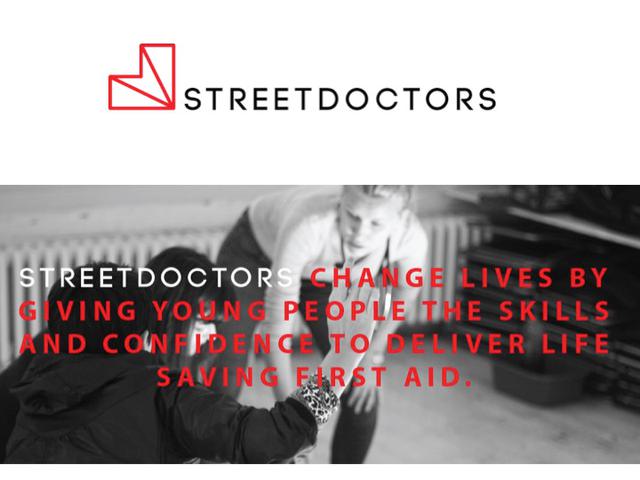StreetDoctors: helping victims of crime
- Exhibited by
- Peter Lewis
- Added
- September 22, 2015
- Medium of Communication
- Target Audience
- Individuals
- Type of Charity
- Medical, young people
- Country of Origin
- UK
- Date of first appearance
- 2008
SOFII’s view
Started by volunteers, StreetDoctors remains committed to continuing to use them wisely and well. It is just so great to see a charity that understands so well that fundraising must be the responsibility of everyone throughout the entire organisation if it is to succeed.
Summary / objectives
StreetDoctors main aim is to give young people involved in the criminal justice system the skills they need to deliver life-saving first aid. They also use first aid as a tool to educate and empower these young people, giving confidence and a sense of responsibility for their actions, helping to change their attitude towards violence.
Young people involved in gangs and youth violence are targeted because they are more likely to be present at the scene of violent crime. Therefore, they are more likely to be able to help at a future incident.
Background
Dr Simon Jackson and Dr Nick Rhead who, at the time, were studying medicine at Liverpool University started StreetDoctors. They were both socially minded and were volunteering through a university-run programme teaching school children basic first aid.
While they were working in Accident and Emergency they saw large number of young people arriving with knife and gun wounds. Often those who had been closest to the victims at time of the incident ran off, leaving their friends in a far worst state than even if they had just called the emergency services before disappearing.
At one training session of 11-16 year olds they asked how many had been present at a knife or gun crime. They all had, or had a friend who had been shot or stabbed.
Both doctors were shocked.
Analysing the situation they contacted the local youth offending team to find out whether they could do something extra that would have more impact than the basic first aid training in schools.
Special characteristics
A regular question is ‘where is it safe to stab someone?’ Answer: ‘nowhere’.
And another: ‘it is just death or glory isn’t it?’ Answer: ‘no. You are more likely to end up with a colostomy bag for the rest of your life.’
These are life-changing conversations.
Seeing a session delivered is a bit like magic. The fact that everyone is a similar age, and the medics not in any position of authority, draws the young people in. Initially often under their hoods, or looking at their phones, the simple yet clinical description of what can happen, and the simple actions that can be taken, means that by the end of an hour and a half session, they are practicing on each other keeping pressure on a wound, or delivering CPR.
To understand what to do in the case of a stabbing the team use a Ribena carton. They stab the carton with a knife. ‘What should you do?’ Most immediately say ‘take the knife out’. They do and the Ribena goes everywhere.
And leads to a practical activity showing how to apply pressure to a wound to keep the blood in the system: simple and powerful.
Influence / impact
From that start in Liverpool StreetDoctors expanded to two medical schools in other cities by 2012.
They also researched the levels of knife and gun crime and their impact; they found that violence is the third leading cause of death of young people in Europe. By August 2015, nine young people had been stabbed to death in London alone.
StreetDoctors realised they needed external help to expand further to meet the needs of young people in different cities across the UK with high levels of knife and gun crime.
So they reached out again, seeking more experienced volunteers, outside of the medical world, to help consolidate and grow.
They worked out the skills they needed – finance, management, social enterprise, fundraising, communications and openly recruited a Steering Group, which became, a few months later, a trustee board of a newly formed charity.
Two years later, in 2015, they are about to expand from 13 medical schools to 17, having taught over one thousand young people in 2014.
At the same time they are developing a new programme in partnership with other organisations, to provide ongoing support for those young people interested in developing further skills in first aid – enabling them to become peer trainers, qualified first aiders and, possibly even, paramedics.
StreetDoctors are also beginning to look at international expansion.
Finally, income generation and fundraising
Dr Charlotte Neary-Bremer, a co-founder, longtime volunteer and now ambassador was instrumental in getting StreetDoctors onto a more formal footing and became its first medical director.
From the outset Charlotte was adamant StreetDoctors could not rely simply on funding coming in centrally (although that had its part to play). It had to come in from each and every team.
So every StreetDoctors team has targets for contracted income – for example with the local youth offending teams – as well as pure fundraising targets from local community fundraising by those teams – putting on events, undertaking sponsored activities, etc.
She also understood the potential future value of current volunteer medics and made sure each team kept its data up to date, developed a very well-used Facebook site and a newsletter to reach out, not just to current volunteers but also past volunteers who might be generous individual donors in due course.
Merits
None of this may seem particularly surprising or innovative but it is the first time I have seen fundraising so embedded across a whole organisation, with the medical director, teams and volunteers just as concerned about hitting their fundraising targets as they are about the number of young people they have trained.
I wish I had thought of StreetDoctors because of its humility in reaching out; its commitment to medical volunteers being the driving force and its insistence that everyone is responsible for income generation.




Also in Categories
Tags
- UK

















